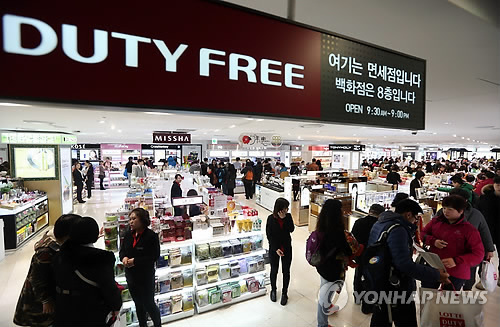Duty-free operators deliver mixed reactions to regulations change
By 손지영Published : March 11, 2016 - 19:06
Forthcoming changes to regulations governing South Korea’s lucrative duty-free business are sparking both hopes and concerns from key stakeholders, such as Lotte, Shilla, Shinsegae and Doosan.
The government is close to reaching a decision on several propositions -- including an extension of the current five-year business license term for duty-free stores to 10 years and raising the license fees by up to 20 times.
The government is close to reaching a decision on several propositions -- including an extension of the current five-year business license term for duty-free stores to 10 years and raising the license fees by up to 20 times.

The Ministry of Strategy and Finance recently announced that it will convene a public hearing on the issue Wednesday and make any necessary amendments to related regulations within this month.
Korean duty-free operators are closely watching for new developments, as the changes could have major implications for the nation’s duty-free business, among the few high-profit sectors in the retail industry amid sluggish domestic spending.
An extension of the license term would foremost reduce risks and uncertainties for existing duty-free operators, which under the current system are pushed to make massive investments into building new inventory systems, infrastructure and networks with no guarantee of renewal after five years.
Moreover, the new term would enable long-running duty-free operators like Lotte and SK Networks, which recently lost their business licenses to rival bidders under the five-year limit, to return to the market.
Lotte Group, a major opponent of the government’s five-year rule, could continue operating its duty-free outlet in Lotte World Tower in southwestern Seoul past the scheduled closedown in June this year. It had been forecast to lose billions of won in profits by losing its second-largest outlet.
At the same time, such possibilities are alarming recent entrants to the urban duty-free market, such as Doosan and Shinsegae, which are still working to set up their stores amid growing pressure from rivals.
With lingering uncertainties, new duty-free operators are reportedly facing hurdles in securing top-class luxury brands -- which are critical to attracting big spenders.
“Since news that the government may approve more duty-free outlets, luxury brands are less flexible in negotiating, as they stand to gain the upper hand when there are more partners to choose from,” said an industry official working in the duty-free business.
Market watchers also note that with an overall increase in the number of duty-free stores operating in Korea, net demand -- closely linked to the number of Chinese tourists to Korea -- must continually rise by a large margin for the industry to retain its momentum.
With broader competition, “the total number of Chinese tourists to Korea must rise by 30 to 50 percent for duty-free operators to keep up their businesses despite their shrunken market share,” said SK Securities analyst Kim Ki-young.
Last year, Korean duty-free stores together posted sales of $8.14 billion, up by just 3 percent from the previous year, with sales to foreign customers dropping for the first time on-year, by 0.63 percent to $5.4 billion, according to the Korea Duty Free Association.
By Sohn Ji-young (jys@heraldcorp.com)








![[KH Explains] How should Korea adjust its trade defenses against Chinese EVs?](http://res.heraldm.com/phpwas/restmb_idxmake.php?idx=644&simg=/content/image/2024/04/15/20240415050562_0.jpg&u=20240415144419)









